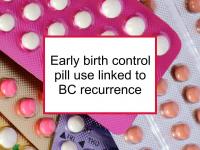Women who start using birth control pills early tend to develop breast cancer at younger ages than those who start using the pill later in life. Little information is available concerning the effects of birth control pill use on prognosis. However, now a new Swedish study has reported that teenage birth control pill use worsens it.
The same study also found that birth control pill use at any age was associated with lower risk of recurrence among women with postmenopausal breast cancer who were treated with aromatase inhibitors.
Some new hormonal contraceptives might carry breast cancer risk
While the lower-dose hormonal contraceptives available in recent years are designed to reduce the risks and side effects of such contraceptives, not all of the newer types are associated with reduced breast cancer risk.
While use of contraceptive injections and implants have not been widely studied, one study reported a marked increase in breast cancer risk among women using subdermal contraceptive implants compared to those using oral or injected contraceptives.
Latest research finds birth control use can influence prognosis
The Swedish prospective study referenced at the beginning of this news story was designed to investigate the associations between oral contraceptive use and breast cancer recurrence among early stage breast cancer patients. The authors also sought to determine whether there was any relationship between prior birth control use and the effectiveness of endocrine treatment (aromatase inhibitors or tamoxifen). The study included 948 women who were diagnosed with breast cancer in Lund between 2002 and 2011 and had no metastases based on post-operative screening. A total of 74% of the study participants had used oral contraceptives at some point. The women were followed for a median of three years until December 2012.
Study participants experienced a total of 100 breast cancer events (local or distant recurrences) during follow up. Overall, ever oral contraceptive use was not found to be associated with recurrence, regardless of duration of use. However, any oral contraceptive use during the teenage years (before age 20) was associated with triple the risk of breast cancer events in women under 50 years compared to no birth control pill use. However, teenage birth control pill use did not increase risk of recurrence among women at least 50 years of age (and likely to be postmenopausal) at diagnosis.
The authors also examined the effects of prior birth control pill use on the effectiveness of aromatase inhibitor and tamoxifen treatments in women with estrogen receptor positive (ER+) disease. Compared to no use of oral contraceptives, previous birth control pill use at any age was found to be associated with significantly lower risk of breast cancer recurrence among women diagnosed at age at least 50 who were treated with aromatase inhibitors. No such reduction in risk was observed for ever users of the pill who were treated with tamoxifen. This suggests that women with ER+ postmenopausal breast cancer who have used the pill at any point in their lives are better off using an aromatase inhibitor rather than tamoxifen as endocrine treatment.
The authors conclude that, if confirmed, history of oral contraceptive use could provide valuable prognostic data and help inform treatment decisions.
Please see our articles on birth control pills and aromatase inhibitors for more information.
